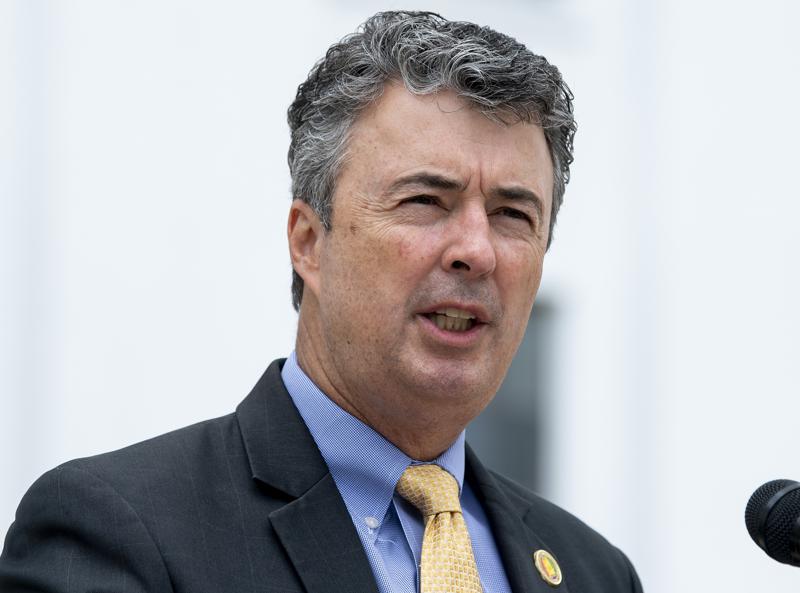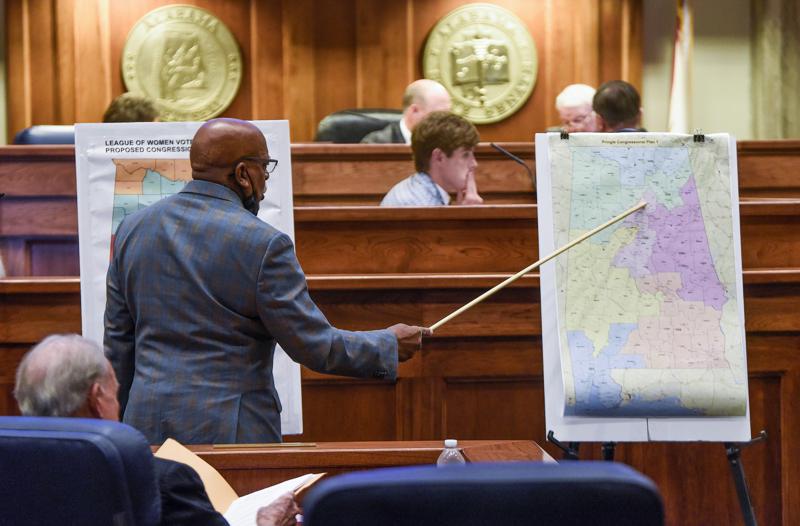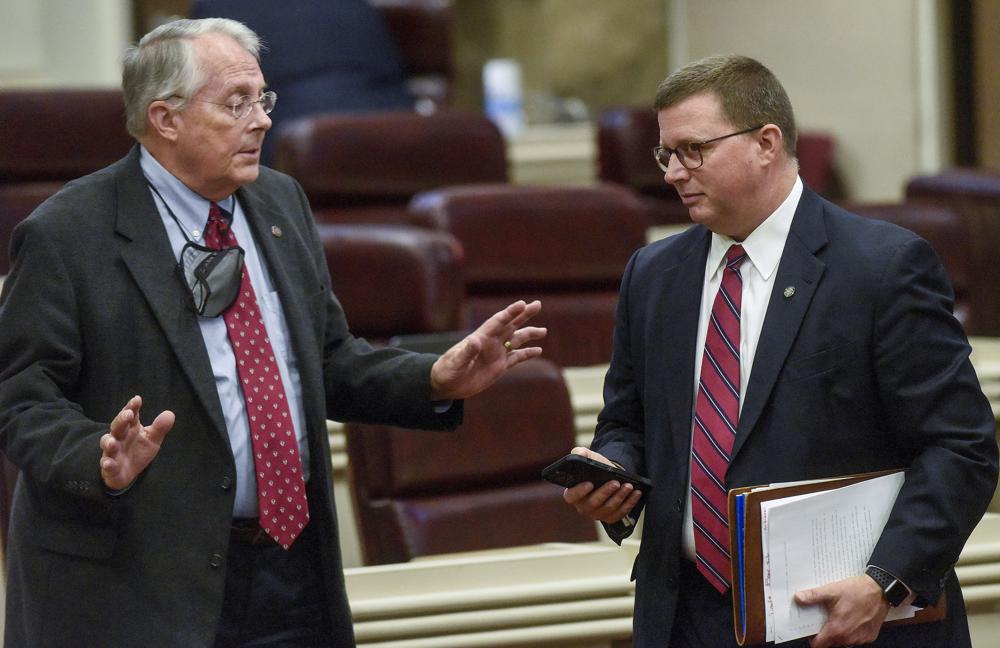Steve Marshall sues Biden Administration over vaccine mandate

Attorney General Steve Marshall is making good on the threat to sue the Biden Administration of the vaccine mandate announced this week. Marshall also filed a lawsuit last Friday challenging the federal-contractor vaccination mandate. Marshall posted yesterday on Twitter, “See you in court, @JoeBiden.” Marshall filed a legal challenge to block President Biden’s private-employer vaccine mandate. The petition for review was filed in the Eleventh Circuit immediately after the rule was formally published Friday morning. The proposed emergency rule from the Occupational Safety and Health Administration (OSHA) requires private companies with 100 or more employees to ensure that their workers are either fully vaccinated by January 4, 2022, or workers will have to submit to weekly testing and wear masks. Marshall stated, “Today, I’ve challenged the Biden Administration’s latest attempt to wreck our nation’s economy while satiating the left’s infatuation with government-mandated immunization. Not only is this mandate based on a faulty public health premise—that workplace immunization will stop the spread of COVID—but it is based on an utterly flawed legal premise as well. When you consider the number of employees impacted by both the federal-contractor and private-employer mandate, Biden has effectively issued a nationwide vaccine mandate. As I have said before, this effort is illegitimate and legally unserious. Based on recent U.S. Supreme Court precedent, I am confident the Eleventh Circuit will agree.” Marshall argued that the mandate will only worsen the labor crisis. Marshall commented, “Our nation is in the midst of a labor crisis. We can see and feel that here in Alabama. Instead of promoting policies that would encourage individuals to re-enter the work force, this Administration has done nothing but deter them. Vaccine mandates don’t guarantee protection from COVID—they guarantee a labor shortage.” Marshall joined colleagues from Florida and Georgia to challenge the OSHA rule, along with one Alabama-based private plaintiff, Scotch Plywood Company, Inc. In late October, Marshall, along with Republican state legislative leaders and the state Personnel Office, issued an advisory regarding the COVID-19 vaccine mandate urging federal contractors in the state to not investigate employees seeing a religious exemption to the COVID-19 vaccine.
Pfizer says COVID-19 pill cut hospital, death risk by 90%

Pfizer Inc. said Friday that its experimental antiviral pill for COVID-19 cut rates of hospitalization and death by nearly 90% in high-risk adults, as the drugmaker joins the race to bring the first easy-to-use medication against the coronavirus to the U.S. market. Currently, all COVID-19 treatments used in the U.S. require an IV or injection. Competitor Merck’s COVID-19 pill is already under review at the Food and Drug Administration after showing strong initial results, and on Thursday, the United Kingdom became the first country to OK it. Pfizer said it will ask the FDA and international regulators to authorize its pill as soon as possible after independent experts recommended halting the company’s study based on the strength of its results. Once Pfizer applies, the FDA could make a decision within weeks or months. If authorized, the company would sell the drug under the brand name Paxlovid. Researchers worldwide have been racing to find a pill against COVID-19 that can be taken at home to ease symptoms, speed recovery, and reduce the crushing burden on hospitals and doctors. Pfizer released preliminary results Friday of its study of 775 adults. Patients who received the company’s drug along with another antiviral shortly after showing COVID-19 symptoms had an 89% reduction in their combined rate of hospitalization or death after a month, compared to patients taking a dummy pill. Fewer than 1% of patients taking the drug needed to be hospitalized, and no one died. In the comparison group, 7% were hospitalized, and there were seven deaths. “We were hoping that we had something extraordinary, but it’s rare that you see great drugs come through with almost 90% efficacy and 100% protection for death,” said Dr. Mikael Dolsten, Pfizer’s chief scientific officer, in an interview. Study participants were unvaccinated, with mild-to-moderate COVID-19, and were considered high risk for hospitalization due to health problems like obesity, diabetes, or heart disease. Treatment began within three to five days of initial symptoms and lasted for five days. Patients who received the drug earlier showed slightly better results, underscoring the need for speedy testing and treatment. Pfizer reported few details on side effects but said rates of problems were similar between the groups at about 20%. An independent group of medical experts monitoring the trial recommended stopping it early, standard procedure when interim results show such a clear benefit. The data have not yet been published for outside review, the normal process for vetting new medical research. Top U.S. health officials continue to stress that vaccination will remain the best way to protect against infection. But with tens of millions of adults still unvaccinated — and many more globally — effective, easy-to-use treatments will be critical to curbing future waves of infections. The FDA has set a public meeting later this month to review Merck’s pill, known as molnupiravir. The company reported in September that its drug cut rates of hospitalization and death by 50%. Experts warn against comparing preliminary results because of differences in studies. Although Merck’s pill is further along in the U.S. regulatory process, Pfizer’s drug could benefit from a safety profile that is more familiar to regulators with fewer red flags. While pregnant women were excluded from the Merck trial due to a potential risk of birth defects, Pfizer’s drug did not have any similar restrictions. The Merck drug works by interfering with the coronavirus’ genetic code, a novel approach to disrupting the virus. Pfizer’s drug is part of a decades-old family of antiviral drugs known as protease inhibitors, which revolutionized the treatment of HIV and hepatitis C. The drugs block a key enzyme which viruses need to multiply in the human body. The drug was first identified during the SARS outbreak originating in Asia in 2003. Last year, company researchers decided to revive the medication and study it for COVID-19, given the similarities between the two coronaviruses. The U.S. has approved one other antiviral drug for COVID-19, remdesivir, and authorized three antibody therapies that help the immune system fight the virus. But they have to be given by IV or injection at hospitals or clinics, and limited supplies were strained by the last surge of the delta variant. Shares of Pfizer spiked more than 9% before the opening bell Friday. Republished with the permission of the Associated Press.
Biden administration sues Texas over new voting restrictions

The Joe Biden administration on Thursday sued Texas over new voting rules that outlasted a summer of dramatic protests by Democrats, who face fading hopes of overhauling the nation’s election laws in response to a wave of new restrictions in Republican-led states. The lawsuit does not challenge the entirety of a sweeping measure signed in September by Republican Gov. Greg Abbott in Texas, which already has some of the nation’s toughest voting rules. It instead targets provisions surrounding mail-in voting requirements and voter assistance, which the Justice Department argues violate federal civil rights protections. “Our democracy depends on the right of eligible voters to cast a ballot and to have that ballot counted,” Attorney General Merrick Garland said. ”The Justice Department will continue to use all the authorities at its disposal to protect this fundamental pillar of our society.” Opponents of the Texas law known as Senate Bill 1 had already sued the state, accusing Republicans of setting out to disenfranchise minorities and other Democratic-leaning voters. Abbott and other Texas Republicans say the changes provide safeguards against voter fraud, which is rare. “Biden is coming after Texas for SB1, our recently enacted election integrity law,” Republican Texas Attorney General Ken Paxton tweeted. It’s a great and a much-needed bill. Ensuring Texas has safe, secure, and transparent elections is a top priority of mine. I will see you in court, Biden!” The legislation in Texas set off a summer of walkouts by Democrats, for which Republicans threatened them with arrest, and Abbott vetoed the paychecks of thousands of rank-and-file staffers when the bill failed to reach him sooner. At one point, more than 50 Democratic lawmakers decamped to Washington, bringing the Texas Capitol to a grinding halt for 38 days. Democrats had hoped to pressure Congress into passing new voting rights protections at the federal level. Both those efforts have stalled, including another attempt Wednesday. Texas is among at least 18 states that have enacted new voting restrictions since the 2020 election, according to the Brennan Center for Justice. The laws are part of a national GOP campaign, including in Florida, Georgia and Arizona, to tighten voting laws in the name of security, partly driven by former President Donald Trump’s false claims that the election was stolen. Trump has called on Abbott to audit the election results in Texas, even though he won the state. Republished with the permission of the Associated Press.
Lawmakers give final OK to congressional, legislative maps

The Alabama Legislature gave final approval Wednesday to new congressional, legislative, and school board districts for the state to use over the next decade, but both Republicans and Democrats expect the plans to be litigated in court. The plans are expected to maintain Republicans’ six-to-one edge in the congressional delegation and lopsided majority at the Alabama Statehouse. Democrats unsuccessfully proposed the creation of a swing district centered in Birmingham that would be competitive for the two political parties. The maps now go to Alabama Gov. Kay Ivey for her signature. If approved, they will be used in the 2022 elections. This is the first time lawmakers do not face the burden of preclearance by the Justice Department — after the U.S. Supreme Court removed the requirement — but lawmakers expect the plans will be litigated in court challenges. House Speaker Mac McCutcheon said there are always lawsuits on redistricting plans. But he said the plans are a fair adjustment of district lines to account for population changes. “We tried to follow everything to the closest letter of the law that we could so we might have a map that would stand … a court hearing,” the Republican speaker said. Democrats opposed the GOP-drawn lines, arguing they are gerrymandered by improperly dividing counties and communities of interest. They also said the maps do not reflect the state’s increased political and racial diversity. The plan is expected to maintain the current partisan balance in the seven-member congressional delegation with six Republicans elected from heavily white districts and one Democrat elected from the only majority-white district. Alabama has a population that is about 26% Black. Republicans voted down Democratic efforts to create one swing congressional district centered in Birmingham that would be competitive between Republicans and Democrats. The swing district would have a population that is 40% Black. Sen. Rodger Smitherman of Birmingham said the plan would avoid splitting counties and accurately reflects the politics of the area which has substantial numbers of both Republican and Democratic voters. “That district itself could go either way that the citizens so desire, and that’s reflective of that area,” Smitherman said. Sen. Jim McClendon, the co-chairman of the redistricting committee, disputed that the congressional districts could be drawn that way without putting the state’s only African American representative at risk of losing an election. There is already a pending lawsuit challenging the state’s current congressional districts, saying they are “racially gerrymandered” and limit Black voters’ influence in all but one congressional district. Challenges are also expected to the legislative maps. The GOP-controlled Legislature in 2017 had to redraw legislative maps under court order to fix racial gerrymandering in 12 districts. The ruling came after Black lawmakers filed a lawsuit challenging the maps as “stacking and packing” Black voters into designated districts to make neighboring districts whiter and more likely to elect conservative Republicans. House Minority Leader Anthony Daniels said this year that there appeared to be “a lot of packing” of white voters in Republican districts. “There was more packing on the majority side — 70-80% white districts in areas that I know should be more diverse,” Daniels said. McCutcheon said in drawing the lines this year that they first drew them without looking at race and based on the existing map and population changes. He said they later calculated the racial composition of districts. “I’m ready to defend these maps in court and if the past is any indication of what’s to come, I probably will be doing so,” McClendon said. Republished with the permission of the Associated Press.
House Republicans advance vaccine exemptions

The Alabama House of Representatives on Thursday advanced legislation to prevent companies from firing workers who claim a religious or medical exemption to COVID-19 vaccination mandates — with lawmakers taking opposing views on whether the measure would be a “job killer” or a job protection measure. Republicans said they were responding to an outcry from constituents afraid of losing their jobs because they haven’t gotten vaccinated. Democrats said the bill would jeopardize both federal contractors in the state and public health for the sake of scoring political points. The House of Representatives voted 67-23 for the bill in a vote that fell along party lines. It now returns to the Alabama Senate where lawmakers will decide whether to accept House changes or send the bill to conference committee. The Republican-sponsored bill says employers must exempt employees from a COVID-19 vaccination requirement if the worker returns a new standardized state form to claim a religious or medical exemption. Employees would check a box for the reason they couldn’t get vaccinated — such as a religious reason, certain qualifying medical conditions, or a health providers’ signed recommendation. There would be no other requirement to prove the exemption. “They’re fearful of losing jobs they’ve had for 20 years, very good jobs that they had with federal contractors,” said Republican Rep. Mike Jones of Andalusia, adding that some people are “truly afraid of the vaccine.” Jones said they were trying to find a way to protect employees who are afraid of getting vaccinated without hurting federal contractors who face a federal mandate to get their workforces vaccinated. But House Minority Leader Anthony Daniels argued the bill would do just that by interfering with a company’s ability to comply with the federal mandate. “I’m angry as hell right now, because this is a job killer,” said Daniels, saying that federal contractors provide many of the jobs in, and around, his Huntsville district. “You cannot say you are pro-business in introducing this piece of legislation.” Other Democrats said the GOP proposal would create a wide-open portal for people to claim an exemption to the vaccination mandate without truly having a valid reason. “You know and I know, everybody, even atheists everybody is going to come up and say it’s because of their religious beliefs,” Democratic Rep. Pebblin Warren said. The bill gives several medical conditions, such as taking a blood thinner, which would exempt an employee from the vaccination mandate. There would be no requirement to provide proof of the condition or religious belief. An employee denied an exemption could appeal to the state Department of Labor. The proposal is a carve-out from existing law which allows companies to fire workers at will. The bill specifies that it wouldn’t alter the ability of an employer to terminate an employee for reasons other than the employee’s COVID-19 vaccination status. The legislation comes as Republican leaders in many states try to find ways to resist the federal vaccine mandate they call an infringement on personal liberties. The bill has drawn opposition from a business group, which said it would put federal contractors in a no-win situation. Alabama has seen at least 15,629 COVID-19 related deaths, and has the second-highest per capita death rate from COVID-19 among states, according to researchers from Johns Hopkins University. Republished with the permission of the Associated Press.


